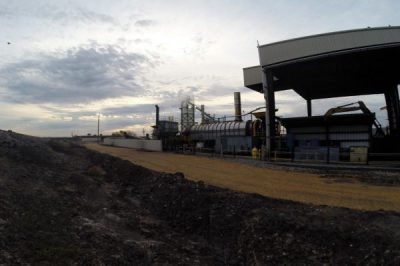 EA was contracted through the Army Contracting Command to demonstrate the remediation of simulated mustard agent-contaminated soils with a thermal desorption unit (TDU) system. Traditionally, agent-contaminated soils are incinerated to destroy any remaining chemical or biological agents present in the soil. EA and our partners, TD*X Associates, LP and El Dorado Engineering, designed a demonstration project to test the effectiveness of an indirect thermal desorption unit (ITDU). Performed in Robstown, Texas using a commercial scale ITDU, owned and operated by TD*X Associates, a series of nine tests were conducted over 36 continuous hours on clay-type soils with moisture contents ranging from approximately 20 to 30% by weight, spiked with simulated mustard agent at concentrations ranging from 525 to 3,440 milligrams per kilogram.
EA was contracted through the Army Contracting Command to demonstrate the remediation of simulated mustard agent-contaminated soils with a thermal desorption unit (TDU) system. Traditionally, agent-contaminated soils are incinerated to destroy any remaining chemical or biological agents present in the soil. EA and our partners, TD*X Associates, LP and El Dorado Engineering, designed a demonstration project to test the effectiveness of an indirect thermal desorption unit (ITDU). Performed in Robstown, Texas using a commercial scale ITDU, owned and operated by TD*X Associates, a series of nine tests were conducted over 36 continuous hours on clay-type soils with moisture contents ranging from approximately 20 to 30% by weight, spiked with simulated mustard agent at concentrations ranging from 525 to 3,440 milligrams per kilogram.
The demonstration tests showed conclusively that non-incineration thermal desorption technology will remediate simulant spiked soils to a condition that correlates to the Health-Based Environmental Standards for mustard of less than 0.010 milligrams per kilogram (<10 micrograms per kilogram) as specified by the U.S. Army Institute of Public Health, and achieve a commensurate removal efficiency of greater than 99.99% removal of simulant from the soil feed. An Addendum to the Test Report was prepared to provide recommended conceptual designs of two purpose-built ITDU systems for consideration by the government:
- A “high capacity” continuous feed ITDU with a nominal capacity of approximately 2.0 cubic yards per hour
- A “low capacity” batch feed ITDU with a nominal capacity of approximately 0.25 cubic yards per hour
- Discussion of the relevant EPA performance and emissions standards governing the design and operation of the ITDU
- Description of the ITDU process including process flow diagrams and equipment design and sizing calculations
- Cost estimates for the mobilization, setup, operation, teardown, and demobilization of the ITDU
Contact Us
